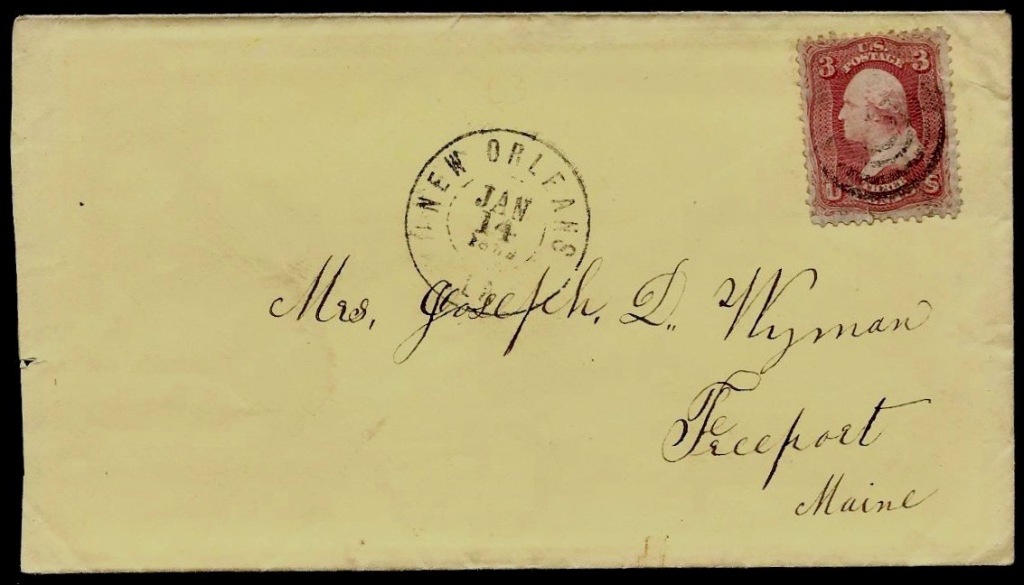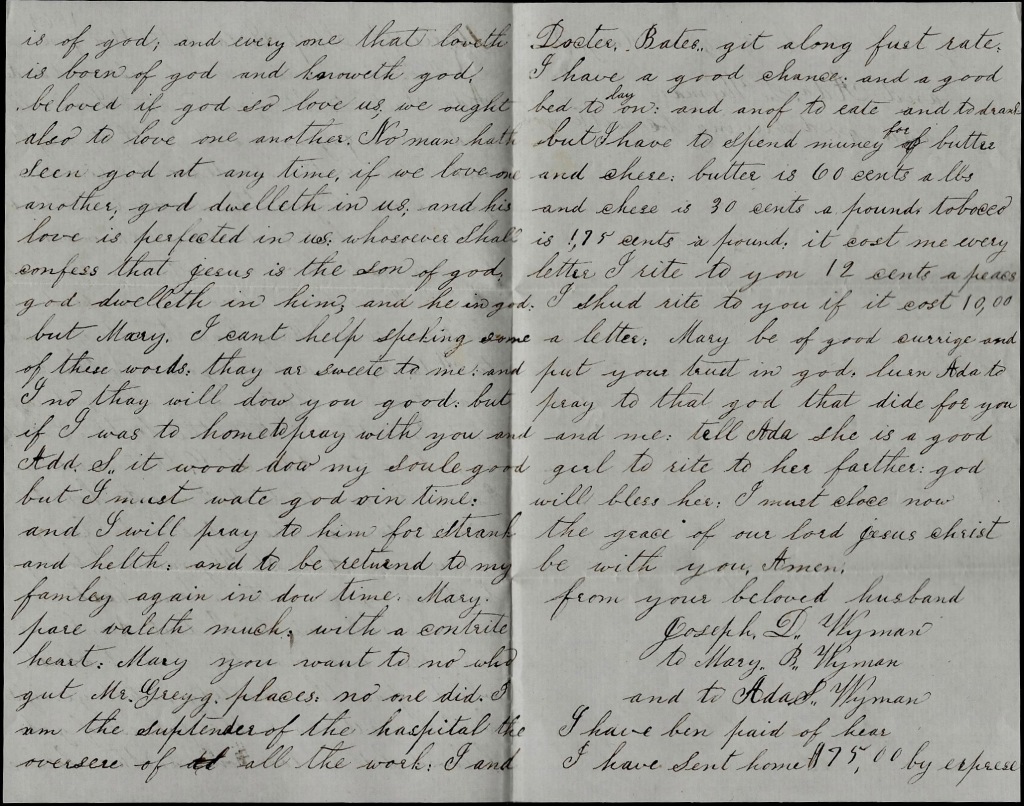
This letter was written by Joseph D. Wyman (1825-1864), the son of John Wyman (1788-1850) and Rachel Beal (1790-1850) of Freeport, Cumberland county, Maine. Joseph was married in November 1850 to Mary B. Soule (1830-1886) and was earning his living as farmer prior to the Civil War. The couple had a son born in 1852 but he died prior to the birth of their daughter Ada on 11 July 1854.
On 10 December 1861, 36 year-old Joseph enlisted in Co. E, 13th Maine Infantry Volunteers. When he wrote this letter in July 1863, it appears he was detached from his regiment working as a hospital attendant on Ship Island off the coast of Mississippi. He reenlisted as a veteran but did not survive the war. He died of “acute diarrhea” at the Armory Square General Hospital in Washington D. C. on 29 July 1863. He was initially buried at Arlington Cemetery in Grave 21, Range 3, Block 2B but his body was exhumed on 26 November 1864 and returned to Freeport.
Witnessing Joseph’s death was a hospital attendant who felt moved to write Mary Wyman the particulars of her husband’s death which some readers may find interesting. The letter was found in the “widow’s pension” file:
Armory Square Hospital
July 29, 1864
Mrs. Mary B. Wyman
Dear Madam
You will probably hear before this letter reaches of you of the death of your husband, Joseph D. Wyman. He died in my ward in this hospital this morning about ten o’clock. He had only been here between four and five days, having been admitted on the 24th, and I had not had much opportunity to become acquainted with him. His disease was acute diarrhea. He had, I think, been sick for some time when he was brought here for he was looking very thin and sick when he came in. This morning when I came into the ward, I found that he was very low, His hands and feet were cold and his pulse almost gone. We applied the most active remedies to bring him up but everything proved of no use and he died, as I said, about ten o’clock.
Just before he died, he said, “All is well—all is well—all is right—all is right. Jesus ’tis sweet—Amen—Amen. Those were his last words and as he spoke them, his eyes were looking upwards as if he were even there beholding the Savior to whom he was going. Surely this must be the greatest possible consolation to you—that he died trusting in Jesus.
His body will be buried in the soldier’s cemetery on Arlington Heights in Virginia. If you wish to have his body taken home, it can be moved any time after the first of October. A funeral service is held over the bodies of all who die and they are taken to the grave in an ambulance escorted by cavalry.
I have written this to you feeling that you would wish to know more than the clerk’s letter would tell you. Accept my sympathy and believe me yours respectfully, — Miss McLellan, Ward H. 1


Joseph’s body was returned to Freeport and lie’s buried in a soldier’s grave with the following epitaph:
“He is not here, he is risen, Oh thou, who o’er thy friends low bier sheddest the bitter drops like rain, Know that a brighter, Happier sphere shall give him to thy arms again. For God has marked each anguished day, and numbered every secret tear. And heavens long age of bliss shall pay for all his children suffer here.”
Transcription

Postmarked in New Orleans, Louisiana
Mississippi Ship Island
11th of January 1863
Most dear and beloved wife and sweet Ada,
I write to let you know that I am well and in enjoying good health tonight and I thank the Lord for his kind care. God is our helper; the Savior is the Lamb of the World. But God is rich in mercy for His great love wherewith He loved us. Mary, I send my love to you, kind and sweet as ever. Mary, I am true to you and to Ada S., and Mary, you may think I am a flattering you but God knows and I know that I tell the truth. I send my love to Ada S. Oh that sweet one. I would to God that I was to home tonight to kiss them sweet cheeks of yours and Ada S. Wyman. I love both of you with a true heart and a sensible mind. I don’t drink nor gamble and to know the love of Christ which passeth knowledge that Ye might be filled with all the fullness of God, beloved let us love one another, for love is of God and everyone that liveth is born of God and knoweth God.
Beloved, if God so love us, we ought also to love one another. No man hath seen God at any time. If we love one another, God dwelleth in us, and His love is perfected in us. Whosoever shall confess that Jesus is the Son of God, God dweller in Him and he in God. But Mary, I can’t help speaking some of these words. They are sweet to me and I know they will do you good. But if I was to home to pray with you and Add S., it would do my soul good. But I must wait God in time, and I will pray to Him for strength and health, and to be returned to my family again in due time. Mary, pray very much with a contrite heart.
Mary, you want to know who got the Gregg places. No one did. I am the superintendent of the hospital—the overseer of all the work. I and a Doctor Bates get along first rate. I have a good chance and a good bed to lay on and enough to eat and to drink. But I have to spend money for butter and cheese. Butter is 60 cents a lb. and cheese is 30 cents a pound. Tobacco is 1.75 cents a pound. It costs me every letter I write to you 12 cents a piece. [But] I should write to you if it cost 10.00 a letter.
Mary, be of good courage and put your trust in God. Learn Ada to pray to that God that did for you and me. Tell Ada she is a good girl to write to her father. God will bless her. I must close now. The peace of our Lord Jesus Christ be with you. Amen.
From your beloved husband, — Joseph D. Wyman
To Mary B. Wyman and Ada S. Wyman
I have been paid off here. I have sent home $75.00 by express. Good luck to you, Mary B. and Ada S. Wyman and God’s blessing be with you.
1 Who was Miss McLellan? Internet searches revealed one or two references to letters she wrote while working as a nurse in Washington D. C. There was a “Marie McClellan” (as it was spelled) who came to Washington D. C. with Nurse Clarissa F. (Jones) Dye in 1862 and I think it might be her. It was stated that she came from Germantown, Pennsylvania—a suburb of Philadelphia.


